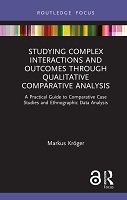Studying Complex Interactions and Outcomes Through Qualitative Comparative Analysis
Proposal review
A Practical Guide to Comparative Case Studies and Ethnographic Data Analysis
Abstract
Studying Complex Interactions and Outcomes Through Qualitative Comparative Analysis: A Practical Guide to Comparative Case Studies and Ethnographic Data Analysis offers practical, methodological, and theoretically robust guidelines to systematically study the causalities, dynamics, and outcomes of complex social interactions in multiple source data sets. It demonstrates how to convert data from multisited ethnography of investment politics, mobilizations, and citizen struggles into a Qualitative Comparative Analysis (QCA).
In this book, Markus Kröger focuses on how data collected primarily via multisited political ethnography, supplemented by other materials and verified by multiple forms of triangulation, can be systematically analyzed through QCA. The results of this QCA offer insight on how to study the political and economic outcomes in natural resource conflicts, across different contexts and political systems. This book applies the method in practice using examples from the author’s own research. With a focus on social movement studies, it shows how QCA can be used to analyze a multiple data source database, that includes results from multiple case studies.
This book is a practical guide for researchers and students in social movement studies and other disciplines that produce ethnographic data from multiple sources on how to analyze complex databases through the QCA.
Keywords
Complex data sets;Complex interactions;Data analysis;Multiple data sources;QCA;Qualitative comparative analysisDOI
10.4324/9781003095101ISBN
9780367557805, 9781032039206, 9781003095101, 9781000412765Publisher
Taylor & FrancisPublisher website
https://taylorandfrancis.com/Publication date and place
2021Imprint
RoutledgeClassification
Psychological methodology
Social research and statistics


 Download
Download